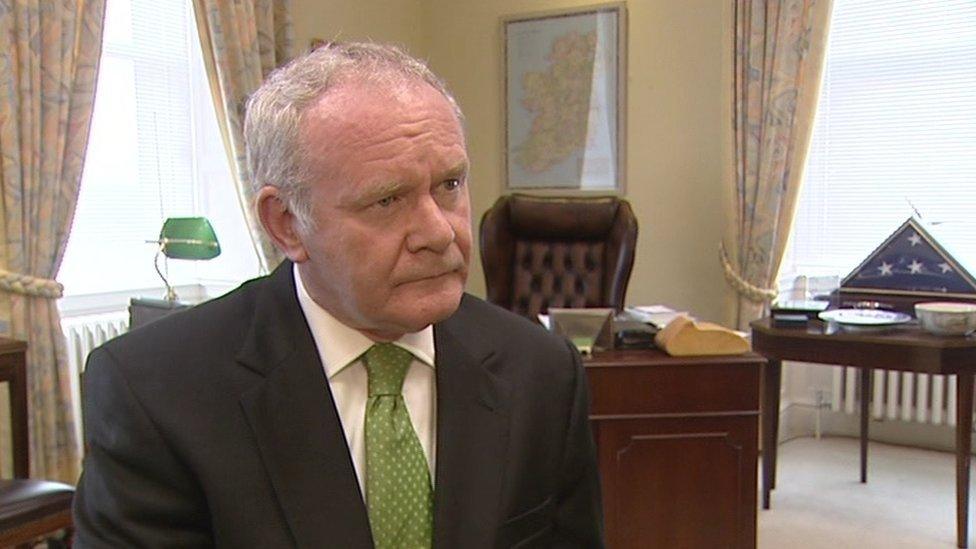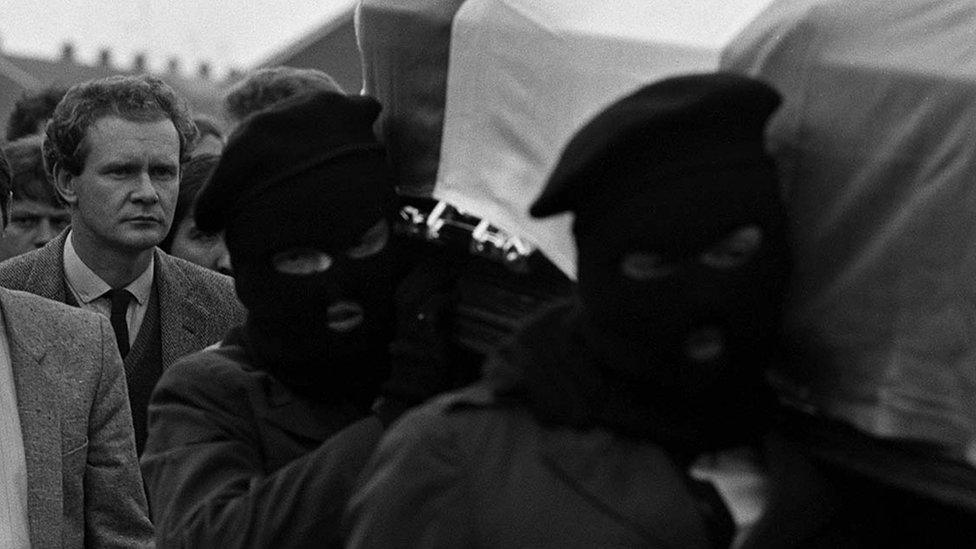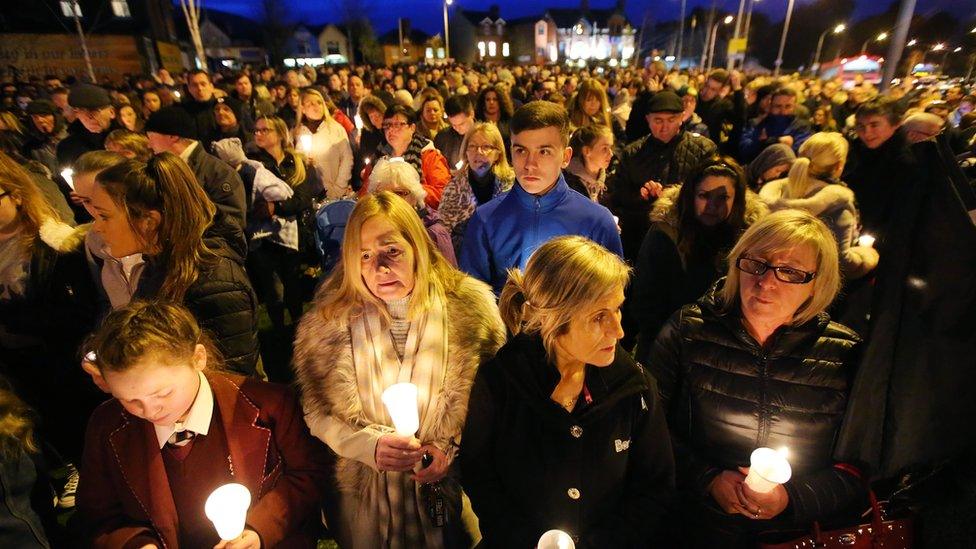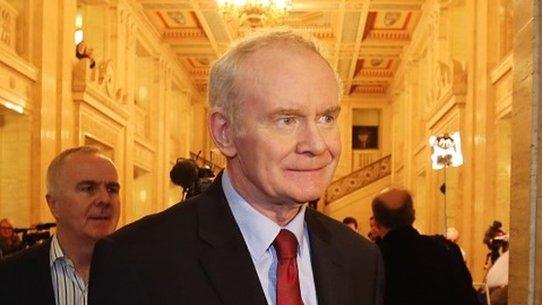Martin McGuinness' Stormont colleagues divided on legacy
- Published

Martin McGuinness inspired incredible loyalty in those who worked for him, a former Stormont director of communications said
Sinn Féin's Martin McGuinness divided opinion sharply throughout his life and continues to do so after his death.
He made an extraordinary transition from commanding IRA men to condemning other Irish republicans as "traitors" when they attacked the security forces.
Many critics find it hard to reconcile his more recent stance on violence with his "lack of remorse" for IRA attacks.
But for one Stormont insider his fierce criticism of dissident republicans was "pivotal" in the peace process.
Stephen Grimason served as the Northern Ireland Executive's director of communications for more than 15 years and during that period he worked very closely with Mr McGuinness.
Speaking to the BBC's Talkback programme, the spin doctor's stand-out memory was Mr McGuinness's reaction to the murder of Constable Stephen Carroll in 2009.
The 48-year-old Catholic was the first officer to be killed since the formation of the Police Service of Northern Ireland.
At a Stormont press conference at the time, Mr McGuinness declared the killers were "traitors to the island of Ireland".
'A bit proud'
"I remember very much the traitors statement was a really, really pivotal moment in 2009 addressing dissidents," said Mr Grimason.
"I remember walking back in with him up the steps afterwards and he said to me: 'Well, what do you think of that?'
"And I said to him: 'Every now and again I get to be a bit proud of the people I work for and this is one of those days.'"
"I said: 'I just hope this isn't going to be a Michael Collins moment for you.'
"He said: 'Oh, thank you for that.'"
The spin doctor was referring to the former IRA leader Michael Collins, who was shot dead by republicans in 1922 after signing a treaty with the British government that led to the partition of Ireland.
Mr Grimason added: "I said: 'You've got to remember, Martin, that this [statement] is going to make you a very big target for the dissidents.'
"And he said: 'I have been a target all my life and everywhere that I go in the world, when I'm being asked about the peace process and what you do, I simply write one word on the blackboard - leadership.'
"That was the nature of him," said Mr Grimason, who is also a former political editor at BBC Northern Ireland.
'Difficult to reconcile'
However, condemning dissident murders while condoning IRA murders appeared hypocritical to some at Stormont, including the DUP's Nelson McCausland.
"I think we need to be mindful, when we look at his legacy, to bear in mind all of those who suffered down through the years through the IRA campaign," Mr McCausland told Talkback.

Martin McGuinness attended the funerals of several IRA members
"Obviously there are questions over the particular, precise role that Martin McGuinness had within the Provisional IRA and how extensive his role was.
"But certainly if we look even at Londonderry down through the years, there are many victims; there are many people whose hearts are broken still today because of the murder of their family members, and that's part of the legacy of Martin McGuinness.
"Then you have that second part of the story - where he moved from terrorism to politics - and those are two things that I sometimes find difficult to reconcile."
Mr McCausland served twice as a minister in the Northern Ireland Executive while Mr McGuinness was deputy first minister.
'Chilling'
"One of the sad things, I think, is that there was no expression of what I would see as remorse for what had been done," said the DUP MLA.
"I think the comment in the Saville Inquiry where he talked, effectively, about an IRA oath curtailing what he could say - that I found quite chilling at the time."
The Saville Inquiry examined the killings of 14 civilians by British soldiers in Derry in 1972.
Mr McGuinness told the inquiry that he was second-in-command of the IRA in Derry at the time of the Bloody Sunday shootings - the first time he had publicly acknowledged his membership of the paramilitary group.
However, he denied claims that he fired the first shot and refused to answer several questions about the IRA's operations at the time.
Mr McCausland also said that as a minister, Mr McGuinness was not a man for details, which he found surprising.
However, despite his past reputation, the Sinn Féin politician became a popular figure among staff at Stormont.
'Sense of humour'
The head of the Northern Ireland Civil Service, Sir Malcolm McKibbin, released a statement on Tuesday saying his employees would feel his loss acutely.
Mr Grimason said he would remember Mr McGuinness as someone with an "impish sense of humour" who was "always winding people up in those terms".
"He had a tremendous amount of patience when things were going badly," he said.
"I don't think I ever saw him lose the rag completely as we saw everyone else do.
"There is that enigma around where he's been, where he's gone to, but I just know that everyone who worked with him became incredibly loyal to him.
"There were a lot of officials in the government who had been through different experiences and were a bit wary about Sinn Féin, and him," added Mr Grimason.
"And ultimately, pretty much all the people who worked on this staff were incredibly devoted to him."
- Published21 March 2017

- Published21 March 2017
